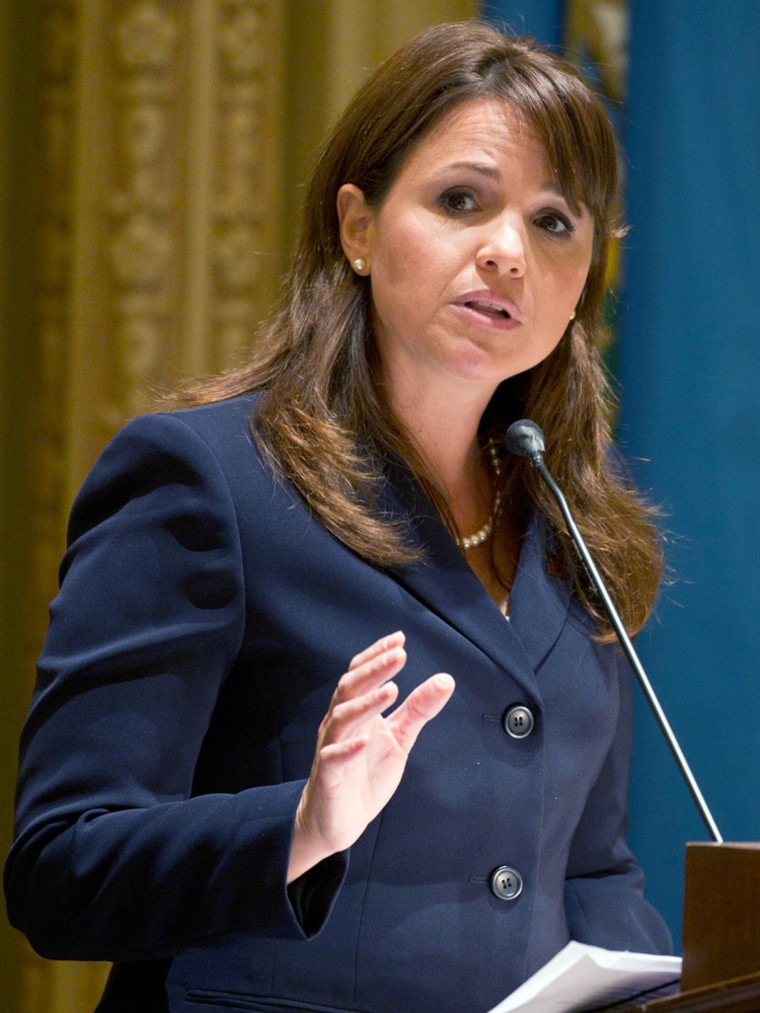Republican Christine O'Donnell challenged her Democratic rival Tuesday to show where the Constitution requires separation of church and state, drawing swift criticism from her opponent, laughter from her law school audience and a quick defense from prominent conservatives.
"Where in the Constitution is separation of church and state?" O'Donnell asked while Democrat Chris Coons, an attorney, sat a few feet away.
Coons responded that O'Donnell's question "reveals her fundamental misunderstanding of what our Constitution is. ... The First Amendment establishes a separation."
She interrupted to say, "The First Amendment does? ... So you're telling me that the separation of church and state, the phrase 'separation of church and state,' is in the First Amendment?"
Her campaign issued a statement later saying O'Donnell "was not questioning the concept of separation of church and state as subsequently established by the courts. She simply made the point that the phrase appears nowhere in the Constitution."
Conservative commentator Rush Limbaugh made the same point in his radio program soon after the debate, saying, "There's nothing in the Constitution about separation of church and state."
The controversy was the latest to befall O'Donnell in a race where she trails badly in the polls against Coons.
Coons is a county executive nominated by the Democrats for the seat held for years by Vice President Joe Biden. O'Donnell, with strong Tea Party support, burst into the national spotlight by winning the Republican primary over a longtime GOP congressman.
The subject of religion and the law came up during their debate at Widener University Law School as O'Donnell criticized Coons for saying that teaching creationism in public school would violate the Constitution.
Coons said private and parochial schools are free to teach creationism — O'Donnell used the term "intelligent design" — but that under the "indispensable principle" of separation of church and state "religious doctrine doesn't belong in our public schools."
He said the separation of church and state was one of a number of "settled pieces of constitutional law" worked out through years of legal development including Supreme Court decisions. He said a woman's right to abortion was another.
He noted again the First Amendment's ban on establishment of religion.
"That's in the First Amendment?" she said, smiling.
Both candidates suggested that the exchange showed the other didn't understand the Constitution.
Origin of 'separation of church and state'
The First Amendment states: "Congress shall make no law respecting an establishment of religion, or prohibiting the free exercise thereof; or abridging the freedom of speech, or of the press; or the right of the people peaceably to assemble, and to petition the Government for a redress of grievances."
The phrase "separation of church and state" is usually traced to President Thomas Jefferson. In a letter in 1802, he referred to the First Amendment and said that it built "a wall of separation between Church & State."
The relationship of government and religion continues to be debated in American law. Many argue that the First Amendment's reference to religion involves the establishment of any particular religion, an important concern to the American colonists, not a ban on all involvement between religion and government.
O'Donnell's comments, in a debate aired on radio station WDEL, created a stir in the audience.
"You actually audibly heard the crowd gasp," Widener University political scientist Wesley Leckrone said after the debate.
Erin Daly, a Widener professor who specializes in constitutional law, said, "She seemed genuinely surprised that the principle of separation of church and state derives from the First Amendment, and I think to many of us in the law school that was a surprise."
During the debate, O'Donnell argued that Coons' views on teaching of theories other evolution showed that he believes in big-government mandates.
"Talk about imposing your beliefs on the local schools," she said. "You've just proved how little you know not just about constitutional law but about the theory of evolution."
Coons said evolution was science, creationism a religious doctrine.
O'Donnell upset Delaware's Republican establishment last month with her victory in the primary, and former George W. Bush adviser Karl Rove has predicted she will cost the party a Senate seat.
Money has been pouring into her campaign from across the country — she raised nearly $4 million in just over a month through the end of September — but she has recently criticized the Republican establishment for not spending more to help.
